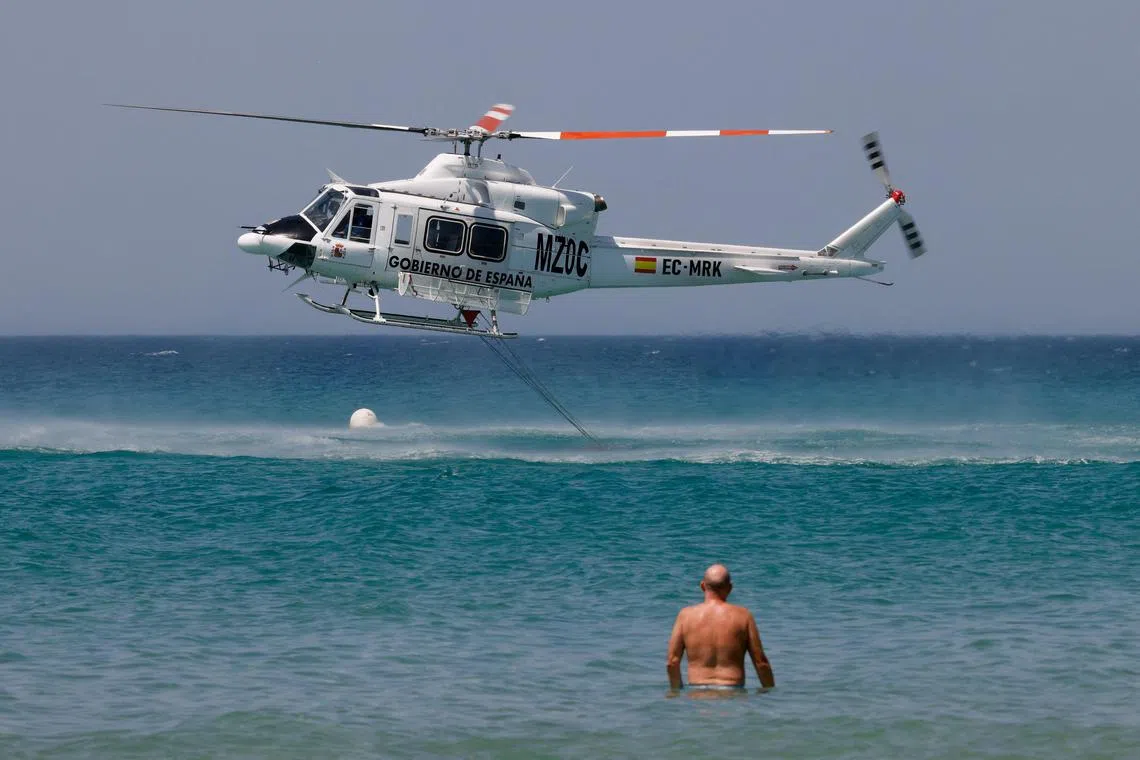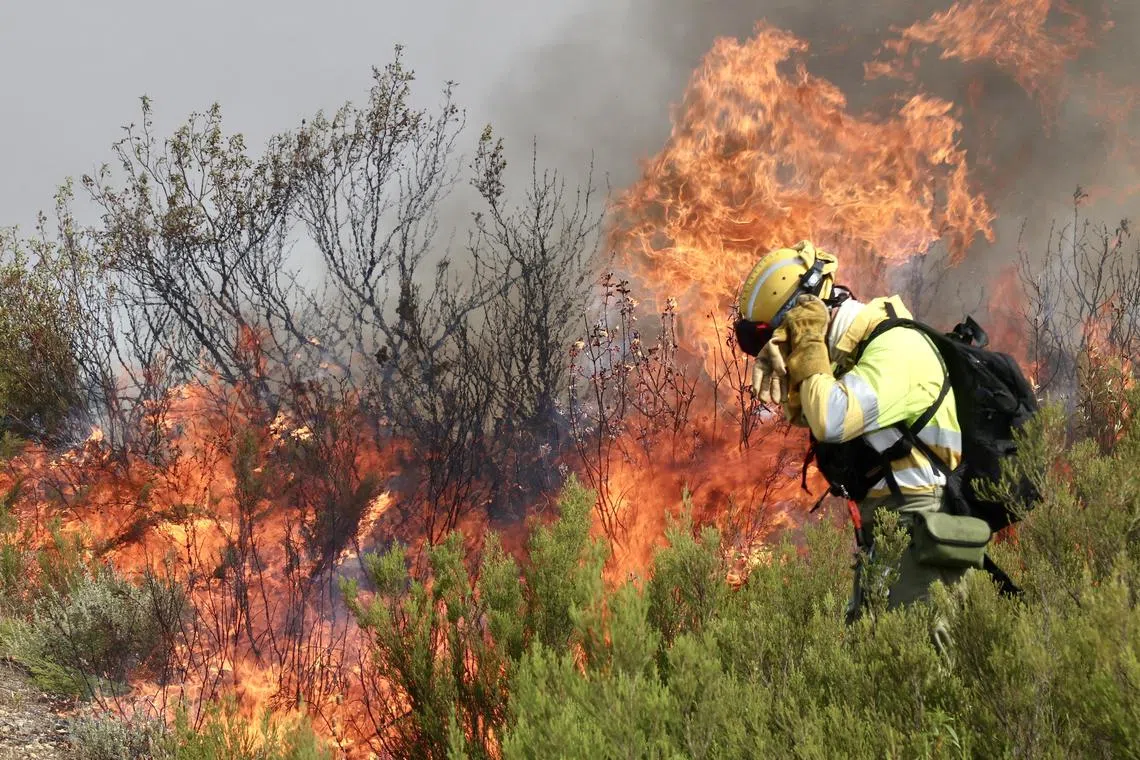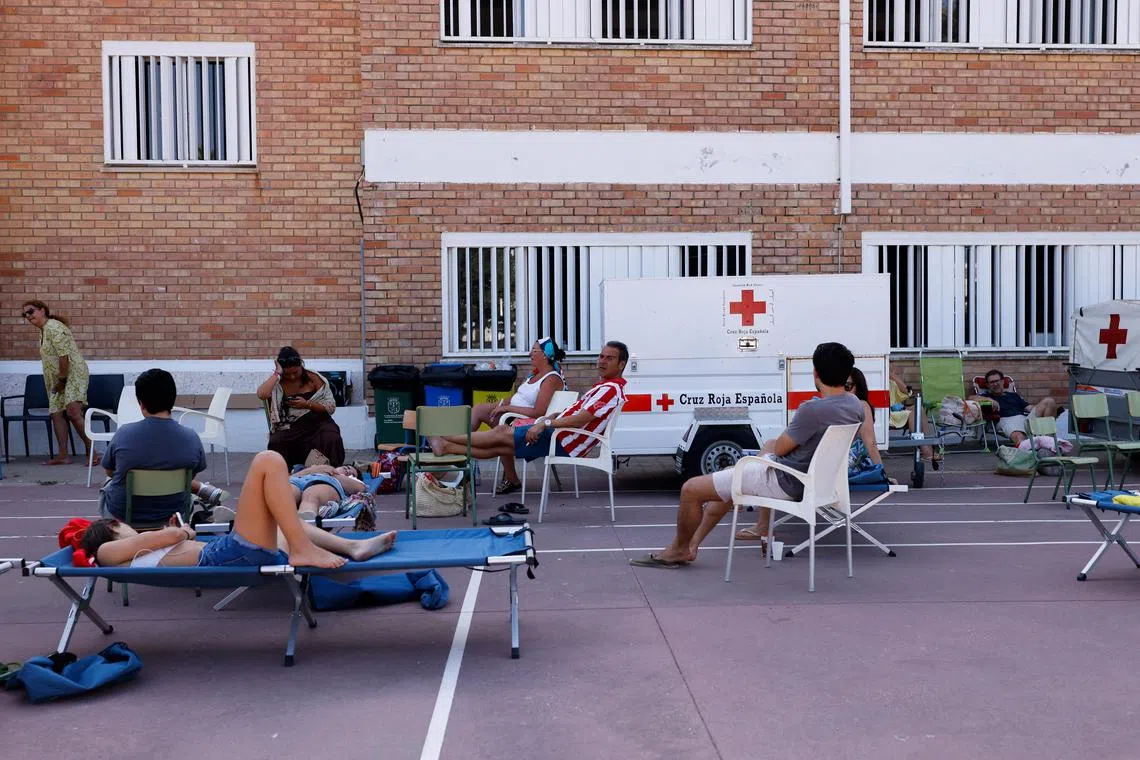‘Cooked alive’: Europe’s wildfires hit tourism spots and forests
Sign up now: Get ST's newsletters delivered to your inbox

A helicopter drawing water off Atlanterra beach as it battles wildfires in Tarifa, Spain.
PHOTO: REUTERS
MADRID – Firefighters in Spain, Portugal, Greece, Turkey and the Balkans were battling wildfires on Aug 12 with another heatwave pushing temperatures over 40 deg C across parts of Europe.
Global warming is giving the Mediterranean region hotter, drier summers whipping up into “whirls”
“We are being cooked alive. This cannot continue,” said a mayor in Portugal, Mr Alexandre Favaios, as three fires burned.
On the outskirts of Spanish capital Madrid, a fire killed a man working at a horse stable and reached some houses and farms but was contained by Aug 12.
To the south in Tarifa, on Spain’s coast close to Morocco, beachgoers and celebrity chef Jose Andres filmed flames and black smoke on the hills above elegant whitewashed villas.
More than 2,000 people were evacuated from Tarifa as the fire – believed to have started in eucalyptus and pine forests – spread. Helicopters doused the blaze with seawater.
In Albania and Montenegro, authorities issued a heatwave warning as temperatures reached 39 deg C.
Germany issued heat warnings for much of the country on Aug 11, with temperatures above 30 deg C expected until Aug 15.
In Italy, red heat alerts were issued for 16 cities, while in France, the authorities declared red or orange weather alerts for much of the country.
In Spain, temperatures were set to reach 44 deg C in some regions, according to meteorology service Aemet. Minimal rainfall and windy conditions were expected to exacerbate the risk.
Spanish military helps
Spain’s Interior Ministry declared a “pre-emergency”, putting national services on standby to support firefighting. Almost 1,000 members of the armed forces are already helping.
Spain’s largest region, Castile and Leon, had 32 wildfires raging on Aug 12, with more than 1,200 firefighters involved.
Five of the fires were categorised as a direct threat to nearby populations.
In Leon province, around 3,780 residents were evacuated, while over 600 residents of seven towns in Zamora were also ordered to leave their homes.
In northern Portugal, more than 1,300 firefighters, backed by 14 aircraft, were battling three large fires. One of them, in the Vila Real area, has been burning for 10 days.
Mayor Mr Favaios pleaded for more government help.
“It’s been 10 days of an extremely hard fight against the flames, 10 days that our population is in panic, without knowing when the fire will knock on their door,” he said.
With two Portuguese waterbombing planes in need of repair, the authorities on Aug 11 requested help from Morocco, which sent two replacement planes.

A firefighter working to extinguish a forest fire in the Sierra de la Culebra in Zamora province, Spain.
PHOTO: EPA
A heatwave that brought temperatures of around 40 deg C to northern Portugal in the past week showed signs of abating on Aug 12, with rain and thunderstorms expected, according toweather service Ipma.
Across the region in Albania, swathes of forest and farmland have been burnt by wildfires in the past week.
Helicopters from the Czech Republic, Slovakia and the United Arab Emirates helped the Balkan state to contain 19 separate wildfires stoked by strong winds on Aug 12.
In neighbouring Montenegro, the authorities, backed by helicopters from Serbia and Croatia, contained a wildfire near the capital Podgorica on Aug 12, with the city covered by smoke.
“Everything that can be paid for and bought will be compensated, but the memories that burned in these four rooms and the attic cannot be compensated,” said resident Dragana Vukovic, against the backdrop of her home’s smouldering rafters.

People resting at a help centre a day after they were evacuated from the Spanish town of Tarifa due to wildfires.
PHOTO: REUTERS
‘Out of control’
In Greece, at Europe’s southernmost tip, wildfires in some cases fanned by gale-force winds forced the evacuation of several villages and a hotel on the tourist islands of Zakynthos and Cephalonia in the Ionian Sea, along with four other parts of the mainland.
“Winds are strong and the wildfire is out of control,” Zakynthos Mayor Yiorgos Stasinopoulos told Greek public broadcaster ERT.
Another 85 firefighters and 10 aircraft fought to stop a fire reaching houses near the western Greek town of Vonitsa.
The picture was similar in Turkey, where a large blaze in the north-western province of Canakkale burned for a second day after hundreds of residents were evacuated in precaution.
Wildfires in Canakkale’s Ezine and Ayvacik districts, which saw Canakkale airport and the Dardanelles Strait closed on Aug 11, were largely brought under control by Aug 12.
But blazes in the city centre in the southern part of the strait were still burning, Agriculture and Forestry Minister Ibrahim Yumakli said in a post on X. REUTERS


